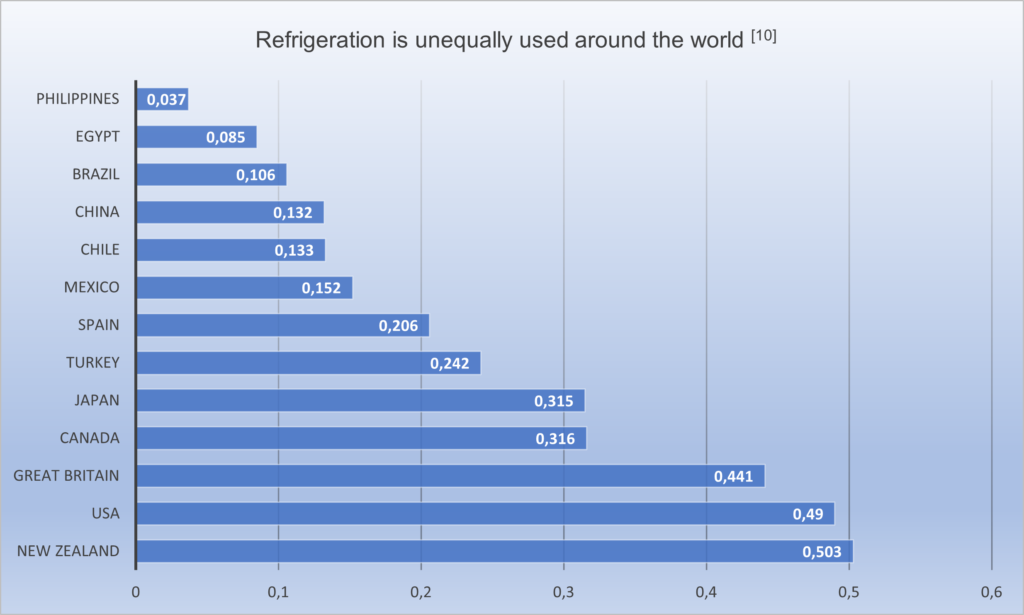Introduction
Refrigeration capacities are not sufficient in developing countries. They will in any case continue to increase, as they are vital. One of the main international challenges we face in mitigating and adapting to global warming is clearly the possibility of implementing sustainable development in these countries. Actions are underway.
The need for sustainable development
Numerous uses
The most important and well-known refrigeration use is the ability to preserve and transport food in good sanitary conditions. The cold chain comprises food production and processing, refrigerated transport, cold storage and refrigerated warehouses, commercial, professional, and domestic refrigeration. 46% of food production should be refrigerated (fruits and vegetables, dairy products, meat and seafood) but less than half actually is, resulting in losses amounting to 13% of food production(1). The need for refrigeration for food security, nutrition, and health purposes (to avoid disease and death) has existed for thousands of years, even if it started with natural refrigeration technologies.
The cold chain is also necessary for plants, flowers, seeds but healthcare products are also in great need: one out of two medicines(2) on the market is currently heat-sensitive and this proportion is increasing since they are biological products (vaccines, etc.). Other health uses are developing: cryosurgery, cryotherapy, scanners…
Air conditioning is also a refrigeration equipment used to preserve human health and not just comfort: for instance, one study(3) suggests that the impact on mortality of days with mean temperatures above 27°C has declined by about 75% during the 20th century in the United States, and that air conditioning is mainly responsible for this decrease. Air conditioning is used for space cooling, in vehicles and also in many factories where a constant temperature is required (information technologies, biotechnologies…).
There are other important uses in industry and in the energy sector. However, this paper will focus on these two main uses, which are both necessary and increasing in most developing countries.
Increasing uses
Population is growing in developing countries, where refrigeration capacities are low. There are more than 800 million undernourished people in the world, particularly in Africa and Asia(4), and these countries are expected to have an additional 2 billion people before 2050. Refrigerated warehouse capacity can be more than 10 times lower in developing countries than in developed countries: see figure 1(5). The same applies to other parts of the cold chain: refrigerated transport, commercialisation, domestic refrigeration.

Implementing in these countries a cold chain similar to that of developed countries could theoretically feed 950 million inhabitants per year(1) thanks to the reduction of food losses, i.e. 1/3 of future needs. There is no doubt that it will be a worldwide priority in the next decades. In addition, it would have a positive environmental impact, with a reduction of more than 47% of the total carbon footprint of the current cold chain (600Mt CO2 equivalent)(6)

Besides its beneficial effect on nutrition and avoiding dangerous bacteria (salmonella, listeria….), the cold chain is vital for health. From 2011 to 2017, the number of heat-sensitive health products increased by 47%(2) and the example of Covid-19 vaccines shows the need for refrigerating equipment everywhere.
Household ownership of space air conditioners varies enormously across countries, from around 4% in India, less than 10% in Europe, 60% in China to over 90% in the United States and Japan, and almost 100% in some Middle Eastern countries. Space air conditioning is expanding dramatically, as is mobile air conditioning: almost all new vehicles sold today are air-conditioned. Africa and South-Asia, currently poorly equipped but situated in warm climates and with the fastest population growth, will certainly have to develop cooling technologies for their populations.
Actions in developing countries
The International Institute of Refrigeration (IIR) recently launched many initiatives and projects, with various partners, in all countries but especially in South Asia and Africa, where needs are greatest.
The IIR has published and will publish updated versions of its various guides and Informatory Notes on suitable technologies such as solar cooling. The IIR published with the United Nations Environment Program (UNEP) six Cold Chain Briefs: Refrigeration in food production and processing; Cold storage and refrigerated warehouse; Transport refrigeration; Commercial; Professional and domestic refrigeration; Fishing vessel application; Vaccines. The IIR, jointly with the World Bank, will soon publish a new guide particularly focused on small off-grid cold storage facilities in developing countries.
The IIR, along with other scientific and technical partners in the United Kingdom and in the countries concerned, helped the World Bank to implement strategies on the development of a better cold chain in Bangladesh and West Bengal (India).
The project in Bangladesh has just been completed. The objective was to propose a strategy to improve and develop the cold chain for meat and dairy products, for smallholder farmers and agro-entrepreneurs. A leaflet “Environmentally sustainable cold chains for the livestock sector in Bangladesh” co-published by the IIR and the World Bank is now available on our website and the conclusions were presented to the government.
The project in West Bengal has also just been completed. The aim was to develop a cold chain based on the use of the rivers of the Ganges delta.
Another project in India, currently underway, was initiated by the Norwegian University of Science and Technology and financed by the Norwegian government. The aim is to identify the best and most economically viable technology solutions to implement CO2 as a refrigerant in India.
As a first action within the project, three CO2 condensing units were shipped from Norway to the three Indian institutions taking part in the project. The objective of this shipment is to demonstrate CO2 refrigeration technology in India for high energy demanding sectors (a supermarket, a hotel and a fish processing industry), overcoming the high ambient temperatures in this country. The prototypes will provide knowledge on the technology to Indian PhDs and Postdoc candidates. Later on, the project will convince local actors to adopt this technology on a full scale.
A new project dedicated to sub-Saharan African countries was launched last year thanks to funding from the European Commission: SophiA – Sustainable off-grid solutions for pharmacies and hospitals in Africa.
The Covid-19 pandemic has shown that most recent health products, and especially vaccines, depend on refrigeration. Indeed, for these products to be effective, they must be stored at low or very low temperatures in special devices. Covid-19 vaccines must be stored between -70°C and +8°C depending on the type. Storage is not the only stage of the cold chain that poses some problems: so do transport, logistics and distribution.
The wide range of vaccine storage temperatures represents a real technical challenge, particularly for African countries that lack adequate storage facilities. In addition to their high cost, there are problems linked to the characteristics of these countries, such as power outages and dust that disrupt the operation of freezers.
The SophiA project directly addresses these issues by providing African people with access to carbon-neutral off-grid electricity, heating and cooling of medicine and food, and safe and clean drinking water, thereby improving quality of life in a sustainable way. SophiA will develop and locally manufacture innovative, modular, flexible, affordable, and efficient solar containers to provide the local population with:
- Clean drinking water
- Hot water for showers and sanitation
- Cooling of building rooms (waiting and surgery rooms)
- Cooling of medicines to +5 °C, also possible for food cooling
- Low temperature storage of blood plasma from -30°C to -40°C
- Very low temperature storage of sensitive drugs (e.g. Covid-19 vaccines) at -70°C
SophiA multifunctional systems will use photovoltaic panels, solar thermal modules, water purification and natural low global warming potential (GWP) refrigerants in a cascade refrigeration system incorporating highly efficient thermal energy storage. The large-scale implementation of these systems will bring many environmental, economic, social, and especially health benefits.
The project will design, build, install and monitor demonstrators in four rural health centres in Burkina Faso, Cameroon, Uganda and Malawi, i.e. where help is most needed, in four different climatic regions, offering sustainable solutions adapted to the African context and then transferable to the whole of sub-Saharan Africa.
Other projects in Africa are being studied. It is time to implement national refrigeration strategies there and it is a clear priority for the IIR.
Conclusion
Particularly since the Rome Declaration in 2019, signed by 76 countries, recognising the importance of the cold chain for sustainable development, it has also become a priority of the United Nations agencies and programmes (UNEP, FAO, World Bank; etc.). We are working in partnership with them as well as with various developed countries that are launching initiatives (European Union and others).
- IIR Informatory Note “The role of refrigeration in worldwide nutrition” March 2020
- SOFRIGAM. Cold chain of healthcare products: logistics with significant challenges. In: sofrigam [online]. (2017) Available on: <http://www.sofrigam.com/cold-chain-healthcare-products-logistics-significantchallenges>(Accessed 19/06/2019)
- BARRECA A.I., CLAY K., et al. Adapting to Climate Change: The Remarkable Decline in the U.S. Temperature-Mortality Relationship Over the 20th Century. Journal of Political Economy, Forthcoming. 2012, 65p. Available on: <http://papers.ssrn.com/sol3/papers. cfm?abstract_id=2192245> (Accessed 19/06/2019)
- FAO The state of Food Security and Nutrition in the World, 2019
- Global Cold Chain Alliance 2018 GCCA Global Storage Capacity report

Didier Coulomb
